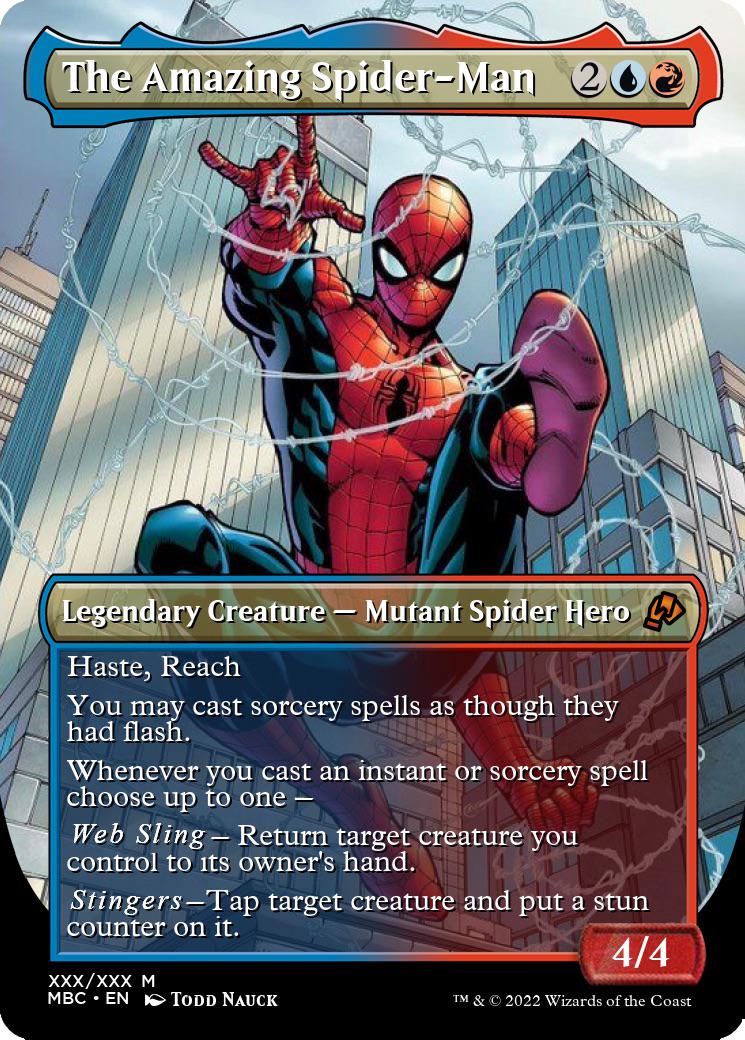Magic: The Gathering has always thrived on the intersections of strategy and creativity, a nuanced dance of wit and power that allows players to engage in battles of mythology and fantasy. With each new set release, the game introduces elements that challenge preconceived notions and demand adaptation. Recently, the latest buzz in the MTG universe stems from the announcement of a Spider-Man-themed set, but it’s not the web-slinger himself who has players abuzz; it’s the emergence of Spider-Punk, a character as disruptive as he is exciting.
When Wizards of the Coast first teased the new Magic set with the Marvel Spider-Man IP in its web, anticipation and skepticism were as tangled as Peter Parker’s double life. The absence of preconstructed Commander decks left some Magic fans puzzled and a tad disappointed, longing for a structured entrée into the whimsical crossover world of their favorite card game and one of Marvel’s most beloved icons. Yet, the revelation of Spider-Punk flipped the narrative, serving up a fresh platter of possibilities for the Commander format congregation.
Spider-Punk, who costs a modest two mana, offers more than just the option of haste or an extra +1/+1 counter through his Riot ability. His true prowess comes from the anarchy he brings to the table: negating the capability for any spells or abilities to be countered, and preventing all damage from being stopped. This alone thrusts him into the spotlight, minimizing the security players find in classic defenses like Counterspell, Teferi’s Protection, or the formidable One Ring. For a subset of players, this revolutionary red-card disruption is like a dashing new vigilante, ready to take on the establishment's cobwebs.
The ripple effects across the community, however, are more complicated. Spider-Punk’s impact is a double-edged guitar riff—on your initiative, having him means pathways are illuminated to the celestial realm of combo victories without the typical interference. Yet, as the turn order slips through your fingers like sand through an hourglass, those around you gain equally potent latitude. Rivals lurking with spells and machinations at instant speed now find their shackles loosened, and before you can fully capitalize on Spider-Punk’s groovy entrance, his diminutive form can be excised from the stage without much reluctance from a well-prepared audience.
Such dynamic versatility, despite its risks, is driving demand for Spider-Punk skyward. The market reflects his newfound stardom with regular copies coursing through the low twenties, foiled editions shimmering near sixty dollars, and the aesthetically bold borderless versions oscillating between forty-eight and fifty-five dollars. A testament to the card's perceived stratagem and cultural clout, these figures speak volumes about the magic of this character beyond just flavor text.
Yet, this magical set isn’t exclusively about Spider-Punk. Glittering rocks like the Soul Stone are setting the pace as marquee chase cards. This indestructible mana rock doesn’t just fuel your mana pool; it doubles up as a graveyard-getaway car for creatures uncertain of when to quit, facilitating a reanimation escapade that refuses to be ignored. Meanwhile, Doctor Octopus stretches his reach towards the potential of a Villain tribal deck, infusing the archetype with card-drawing prowess only his mechanical appendages could juggle. Green Goblin, on a different tact, introduces the cunning Mayhem mechanic, turning discarded resources into a battalion of playable threats, redefining waste management in the colorful cosmos of card play.
As the Magic world braces for the full Spider-Man set's release, speculations and strategies are spinning webs of their own. Punk music is about defiance, chaotic energy, and rewriting the rules—traits that Spider-Punk embodies and brings to the MTG table. His presence in the format champions new thinking, a departure from the linear to the labyrinthine—where the sacred doctrines of counter magic and bulletproof protections find themselves briefly benched in lieu of raw, unfiltered play.
Whether Spider-Punk cements himself as a recurring anthem in Commander decks or ends up as an ephemeral hit, the conversation he has ignited is undeniable. He demands a recalibration from players, beckoning a return to the core of the game: adaptation. In a vibrant, ever-evolving tableau of legends, paradoxes, and play styles, Spider-Punk may just be the muse that Commander didn't know it needed—pinning its strategies on a movement that thrills as much as it makes us spin in evanescent circles, laughing at the madness of it all.
Spider-Man MTG


Comments